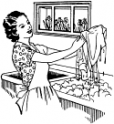Spruce Up
Cleans up good.
Dear Word Detective: I recently purchased some DVD’s of the old “Little Rascals” TV shows for my three year old. One of the shows was entitled “Sprucin’ Up,” and I realized, while explaining what that meant to my son, that I had no idea where that might have come from. Webster’s was not very helpful, saying the word spruce is perhaps related to a middle English alteration of the Anglo-French “Pruce” for “Prussian.” Did they consider Prussians very neat and tidy, thus getting the sense of the phrase today? — Chris Lenz.
 Gee, I always figured “spruce up” referred to the piney odor of popular household cleansers. Speaking of things piney, today I saw a commercial in which the people who make Pine-Sol (the main ingredient of which is, hold the phone, pine oil) announced that they are holding a contest to pick their “new fragrance.” Say what? Isn’t that akin to picking a “new fragrance” for lemonade? Isn’t the whole point of Pine-Sol that you can smell pine oil a block away?
Gee, I always figured “spruce up” referred to the piney odor of popular household cleansers. Speaking of things piney, today I saw a commercial in which the people who make Pine-Sol (the main ingredient of which is, hold the phone, pine oil) announced that they are holding a contest to pick their “new fragrance.” Say what? Isn’t that akin to picking a “new fragrance” for lemonade? Isn’t the whole point of Pine-Sol that you can smell pine oil a block away?
By the way, although you and I saw the “Little Rascals” series on TV, it was originally produced by Hal Roach as an immensely popular series of “shorts” (under the name “Our Gang”) and released to movie theaters between 1922 and 1944.
Meanwhile, back at your question, whichever dictionary you consulted was being a bit too cautious with that “perhaps.” The verb “to spruce” meaning “to make neat and clean” and the related adjective “spruce” meaning “neat and dapper in appearance” are both definitely related to Prussia, once a kingdom of northern Europe and now a region of modern Germany. The original English name for Prussia was “Pruce,” borrowed from the Old French, but at some point in the 14th century that was altered by English-speakers, for some unknown reason, to “Spruce.” The “spruce” evergreen tree was originally called a “spruce fir” and thought to have originated in “Spruce,” i.e., Prussia.
The connection between neatness and “spruce” is a little more roundabout than simply a tribute to the legendary Prussian penchant for fastidious organization. During this same period England was importing a wide variety of goods from Prussia, many of which were popularly known by their country of origin, e.g., “Spruce canvas,” “Spruce beer,” “Spruce iron,” etc. Apparently “Spruce leather” was an especially high-grade product, and it came to be used in a particular style of leather jerkin (a short, sleeveless jacket) that became very popular and was known as a “Spruce jerkin.” This led to “spruce” breaking free of its tie to Prussia in popular speech and becoming, instead, a synonym for “neat, trim, fashionable” in the 16th century. By the late 17th century, “spruce” as a verb had been joined with “up,” and we’ve been “sprucing up” our households and ourselves ever since.
Page 1 of 2 | Next page
